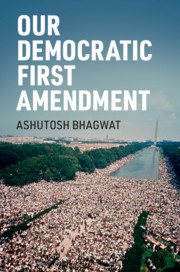Book contents
- Our Democratic First Amendment
- Our Democratic First Amendment
- Copyright page
- Dedication
- Contents
- Acknowledgments
- Introduction
- Part I The Framers’ Democratic First Amendment
- Part II The Democratic First Amendment in the Age of Twitter
- 5 Cacophony: Speech and Press in the Internet Era
- 6 DeSiloing: Of Civic Associations, Book Clubs, and Taverns
- 7 Why Assembly and Petition Still Matter
- Conclusion
- Index
5 - Cacophony: Speech and Press in the Internet Era
from Part II - The Democratic First Amendment in the Age of Twitter
Published online by Cambridge University Press: 28 May 2020
- Our Democratic First Amendment
- Our Democratic First Amendment
- Copyright page
- Dedication
- Contents
- Acknowledgments
- Introduction
- Part I The Framers’ Democratic First Amendment
- Part II The Democratic First Amendment in the Age of Twitter
- 5 Cacophony: Speech and Press in the Internet Era
- 6 DeSiloing: Of Civic Associations, Book Clubs, and Taverns
- 7 Why Assembly and Petition Still Matter
- Conclusion
- Index
Summary
Chapter 5 examines the impact of the Internet and social media on how the speech and press rights discussed in Chapter 1 operate in the context of our modern democracy. New technology has had two primary consequences: to democratize public debate by permitting any and all citizens to reach potentially vast audiences, and to disintermediate public debate by reducing the role of the mainstream media and political leadership as gatekeepers of the flow of information and ideas to citizens. In the early Internet era it was hoped that these developments would revitalize democracy. Instead, their actual impact has been to produce cacophony, political polarization, and a collapse of social consensus regarding even basic facts. The balance of the chapter proposes possible solutions to address these pathologies. Importantly, the chapter does not suggest that a return to elite intermediaries such as media entities is plausible. Instead, it explores ways in which the democratizing potential of the Internet can be harnessed to create new institutions that might be broadly trusted, at least as to factual matters, and so might help ease political polarization.
- Type
- Chapter
- Information
- Our Democratic First Amendment , pp. 101 - 118Publisher: Cambridge University PressPrint publication year: 2020



